《英语惯用法》xin
英语惯用法
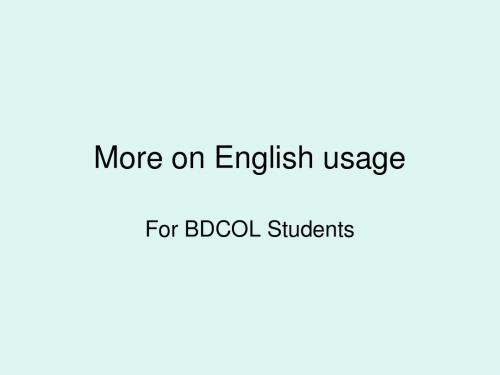
•
•
Often and nowadays
• Do not use the word oftentimes where often will suffice (which is pretty much everywhere), or say “to include” in place of including. If all the other officers jumped off a bridge, would you do it too? • Air Force doctrine documቤተ መጻሕፍቲ ባይዱnts often include more bright colors than bright ideas. • The CINC should be given greater authority, including the right to set his own ROE. • BDCOL students LOVE the term ―nowadays‖ for ―now’ or ―today.‖ •
Feel and believe
• People feel emotions and sensations, they believe ideas and facts. At SAAS, you will often have occasion to write about what leaders and theorists believe, think, assert, maintain, argue, and predict, but rarely if ever will you need to discuss what they feel. • Clausewitz believed that the defense was the strongest form of war. • Stalin felt betrayed when Germany attacked, though it seems hard to believe. • Napoleon felt ill on the day of Waterloo, but he expected that he would win anyway. • I feel uneasy about my presentation. Will the general think it is worthless?
初中英语习惯用法大全
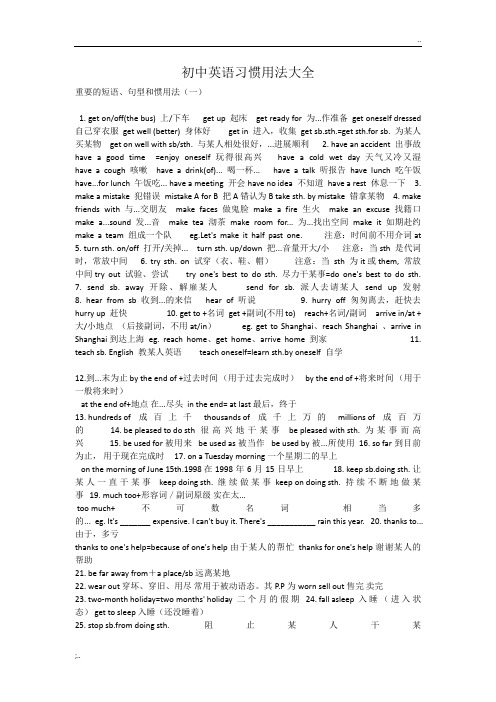
初中英语习惯用法大全重要的短语、句型和惯用法(一)1. get on/off(the bus) 上/下车get up 起床get ready for 为...作准备get oneself dressed 自己穿衣服get well (better) 身体好get in 进入,收集get sb.sth.=get sth.for sb. 为某人买某物get on well with sb/sth. 与某人相处很好,...进展顺利2. have an accident 出事故have a good time =enjoy oneself 玩得很高兴have a cold wet day 天气又冷又湿have a cough 咳嗽have a drink(of)... 喝一杯... have a talk 听报告have lunch 吃午饭have...for lunch 午饭吃... have a meeting 开会have no idea 不知道have a rest 休息一下3. make a mistake 犯错误mistake A for B 把A错认为B take sth. by mistake 错拿某物4. make friends with 与...交朋友make faces 做鬼脸make a fire 生火make an excuse 找籍口make a...sound 发...音make tea 沏茶make room for... 为...找出空间make it 如期赴约make a team 组成一个队eg.Let's make it half past one. 注意:时间前不用介词at5. turn sth. on/off 打开/关掉... turn sth. up/down 把...音量开大/小注意:当sth 是代词时,常放中间6. try sth. on 试穿(衣、鞋、帽)注意:当sth 为it或them, 常放中间try out 试验、尝试try one's best to do sth. 尽力干某事=do one's best to do sth.7. send sb. away 开除、解雇某人send for sb. 派人去请某人send up 发射8. hear from sb 收到...的来信hear of 听说9. hurry off 匆匆离去,赶快去hurry up 赶快10. get to +名词get +副词(不用to) reach+名词/副词arrive in/at +大/小地点(后接副词,不用at/in)eg. get to Shanghai、reach Shanghai 、arrive in Shanghai到达上海eg. reach home、get home、arrive home 到家11. teach sb. English 教某人英语teach oneself=learn sth.by oneself 自学12.到...末为止 by the end of +过去时间(用于过去完成时) by the end of +将来时间(用于一般将来时)at the end of+地点在...尽头 in the end= at last 最后,终于13. hundreds of 成百上千 thousands of 成千上万的 millions of 成百万的 14. be pleased to do sth 很高兴地干某事 be pleased with sth. 为某事而高兴 15. be used for 被用来 be used as 被当作 be used by 被...所使用 16. so far 到目前为止,用于现在完成时 17. on a Tuesday morning 一个星期二的早上on the morning of June 15th.1998 在1998年6月15日早上 18. keep sb.doing sth. 让某人一直干某事 keep doing sth. 继续做某事 keep on doing sth. 持续不断地做某事 19. much too+形容词/副词原级实在太...too much+不可数名词相当多的... eg. It's _______ expensive. I can't buy it. There's ___________ rain this year. 20. thanks to...由于,多亏thanks to one's help=because of one's help 由于某人的帮忙 thanks for one's help 谢谢某人的帮助21. be far away from+a place/sb 远离某地22. wear out 穿坏、穿旧、用尽常用于被动语态。
初中英语重要短语、惯用法(60组)
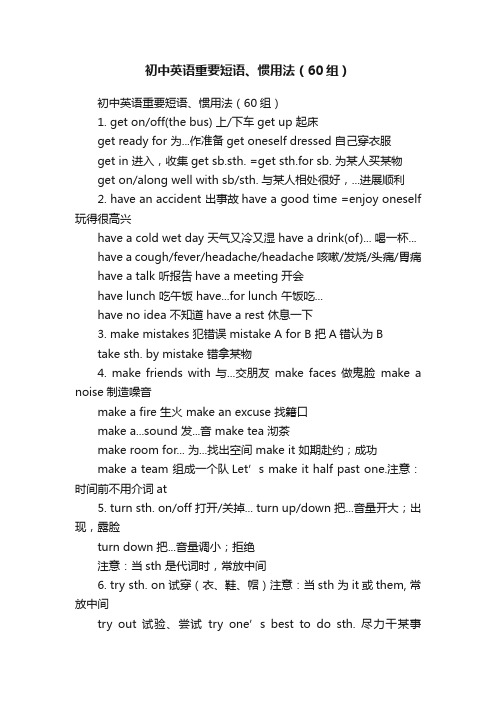
初中英语重要短语、惯用法(60组)初中英语重要短语、惯用法(60组)1. get on/off(the bus) 上/下车get up 起床get ready for 为...作准备get oneself dressed 自己穿衣服get in 进入,收集get sb.sth. =get sth.for sb. 为某人买某物get on/along well with sb/sth. 与某人相处很好,...进展顺利2. have an accident 出事故have a good time =enjoy oneself 玩得很高兴have a cold wet day 天气又冷又湿 have a drink(of)... 喝一杯...have a cough/fever/headache/headache 咳嗽/发烧/头痛/胃痛have a talk 听报告have a meeting 开会have lunch 吃午饭 have...for lunch 午饭吃...have no idea 不知道have a rest 休息一下3. make mistakes 犯错误 mistake A for B 把A错认为Btake sth. by mistake 错拿某物4. make friends with 与...交朋友make faces 做鬼脸make a noise制造噪音make a fire 生火 make an excuse 找籍口make a...sound 发...音 make tea 沏茶make room for... 为...找出空间 make it 如期赴约;成功make a team 组成一个队Let’s make it half past one.注意:时间前不用介词at5. turn sth. on/off 打开/关掉... turn up/down 把...音量开大;出现,露脸turn down 把...音量调小;拒绝注意:当sth 是代词时,常放中间6. try sth. on 试穿(衣、鞋、帽)注意:当sth 为it或them, 常放中间try out 试验、尝试try one’s best to do sth. 尽力干某事=do/try one’s best to do sth.try to do 尽力做try doing sth 尝试做7. send sb. away 开除、解雇某人send sb sth=send sth to sb 送给某人某物send for sb. 派人去请某人 send up 发射8. hear from sb 收到...的来信 hear of 听说9. be famous/known for 因……而出名be famous/known as 以……而出名be famous/known to sb 为某人所熟知10. get to +名词get +副词(不用to) reach+名词/副词arrive in/at +大/小地点(后接副词,不用at/in)eg. get to Shanghai/reach Shanghai /arrive in Shanghai到达上海eg. reach home、get home、arrive home 到家11. teach sb. English 教某人英语teach oneself=learn sth.by oneself 自学12.到...末为止by the end of +过去时间(用于过去完成时)by the end of +将来时间(用于一般将来时)at the end of+地点在...尽头 in the end= at last 最后,终于13. hundreds of 成百上千thousands of 成千上万的millions of 成百万的注意:当hundred、thousand、millioin前有具体的数字出现时,不加s 不带of.如:five hundred six thousand seven million14. like to do sth./like doing sth.意为“喜欢做某事”,前一种句型侧重具体的一次性的动作;后一种句型侧重习惯性的动作.试比较:Tom likes swimming, but doesn’t like to swim this afternoon.15. be used for 被用来be used as 被当作be used by 被...所使用used to do sth过去做…… be/get used to doing sth 习惯于做谋事be used to do sth 被用来做谋事16. so far 到目前为止,in the past/last few years 用于现在完成时17. on a Tuesday morning 一个星期二的早上in the morning 在上午如:on the morning of June 15th.2017 在2017年6月15日早上18. keep sb. doing sth. 让某人一直干某事keep doing sth. 继续做某事keep on doing sth. 持续不断地做某事19. much too= very +形容词/副词原级很;非常...too much+不可数名词/动词后太多...too many+可数名词复数形式太多……eg. It’s _______ expensive. I can’t buy it. There’s ___________ rain this year.20. thanks to...由于,多亏thank you for=thank for因……而感谢thanks to one’s help=because of one’s help 由于某人的帮忙thanks for one’s help 谢谢某人的帮助21. in the tree表示“在树上(非树本身所有)”;on the tree表示“在树上(为树本身所有)”。
英语语法与惯用法知识点总结.doc

英语语法与惯用法知识点总结【英语语法】一、语法与惯用法知识点:习惯上后接in doing sth的常见名词1.delay 耽搁; 延迟,拖延用于delay in doing sth,表示“在做某事方面的耽搁”。
如:Excuse me for my delay in answering your letter.迟复为歉。
My delay in going abroad is due to my illness.我推迟出国是由于我生病了。
2. delight 快乐,乐趣用于delight in doing sth,表示“做某事的乐趣”“以做某事为乐”。
如:He finds delight in giving to others.他以助人为乐。
I find a perverse delight in listening to traffic.我从听车流噪音中找到一种怪异的乐趣。
注意有用结构take delight in doing sth(喜欢做某事,从做某事中取乐)。
如:She took delight in teasing me.她老爱跟我开玩笑。
Now many people take delight in watching TV.现在许多人都喜欢看电视。
He takes great delight in proving others wrong.他的极大乐趣是证实别人错了。
3. harm 危害用于harm in doing sth,表示“做某事的危害”,尤其用于no harm in doing sth结构。
如:What’s the harm in having a little fun?开点玩笑有什么不好?He may not be able to help but there’s no harm in asking him.他可能帮不了忙,但是求他一下倒也无妨。
The problem may not arise, but there’s no harm in keeping our powder dry.问题不一定会发生,但有备无患并无害处。
英语单词惯用法(1)
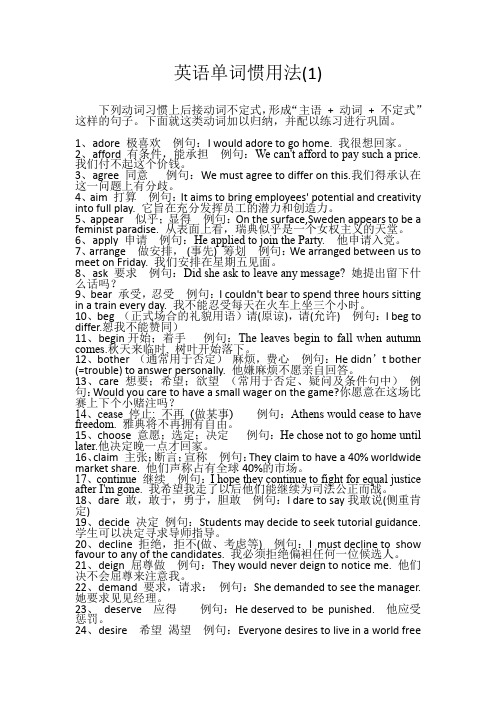
英语单词惯用法(1)下列动词习惯上后接动词不定式,形成“主语+ 动词+ 不定式”这样的句子。
下面就这类动词加以归纳,并配以练习进行巩固。
1、adore 极喜欢例句:I would adore to go home. 我很想回家。
2、afford 有条件,能承担例句:We can't afford to pay such a price.我们付不起这个价钱。
3、agree 同意例句:We must agree to differ on this.我们得承认在这一问题上有分歧。
4、aim 打算例句:It aims to bring employees' potential and creativity into full play. 它旨在充分发挥员工的潜力和创造力。
5、appear 似乎;显得例句:On the surface,Sweden appears to be a feminist paradise. 从表面上看,瑞典似乎是一个女权主义的天堂。
6、apply 申请例句:He applied to join the Party. 他申请入党。
7、arrange 做安排,(事先) 筹划例句:We arranged between us to meet on Friday. 我们安排在星期五见面。
8、ask 要求例句:Did she ask to leave any message? 她提出留下什么话吗?9、bear 承受,忍受例句:I couldn't bear to spend three hours sitting in a train every day. 我不能忍受每天在火车上坐三个小时。
10、beg (正式场合的礼貌用语)请(原谅),请(允许) 例句:I beg to differ.恕我不能赞同)11、begin开始;着手例句:The leaves begin to fall when autumn comes.秋天来临时, 树叶开始落下。
英语惯用法

20. Her brother is a bell-boy.
[正」她哥哥是个侍者。
21. It's yours for the asking.
[正]只要你要,它就是你的。
22. Her husband is in the dock.
[正」汽车状况良好。
15. The girl looks like a million dollars.
[正」那个女孩很动人。
16. They all stand up to the plan.
[正]他们都反对那个计划
17. The fellow is a second-story man,
[正]我弟弟特别喜爱吃巧克力。
38. We answered yes to a man.
[正]我们全体同意了:
39. It is nice and warm in the house.
[正」这房间里很暖和。
40. She gave him the lie.
[正]那个人是个夜盗。
18. He earned very little money and could hardly keep the wolf from the door
[正]他挣的钱很少,几乎不能养家糊口:
19. Don't make a fuss of them!
56. The woman dressed up to the nines.
[正]那个妇女穿着华丽的衣服。
57. The secretary talked nineteen to the dozen.
[正」秘书滔滔不绝地讲话。
资料:初中英语重要短语、句型和惯用法
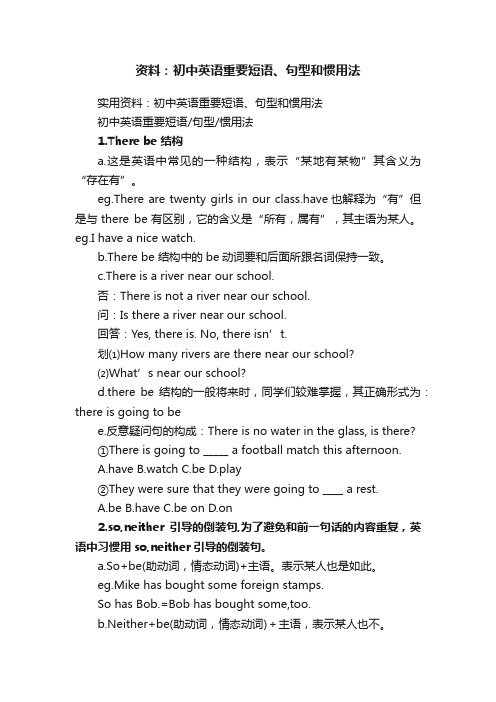
资料:初中英语重要短语、句型和惯用法实用资料:初中英语重要短语、句型和惯用法初中英语重要短语/句型/惯用法1.There be 结构a.这是英语中常见的一种结构,表示“某地有某物”其含义为“存在有”。
eg.There are twenty girls in our class.have也解释为“有”但是与there be有区别,它的含义是“所有,属有”,其主语为某人。
eg.I have a nice watch.b.There be 结构中的be动词要和后面所跟名词保持一致。
c.There is a river near our school.否:There is not a river near our school.问:Is there a river near our school.回答:Yes, there is. No, there isn’t.划⑴How many rivers are there near our school?⑵What’s near our school?d.there be 结构的一般将来时,同学们较难掌握,其正确形式为:there is going to bee.反意疑问句的构成:There is no water in the glass, is there?①There is going to _____ a football match this afternoon.A.haveB.watchC.beD.play②They were sure that they were going to ____ a rest.A.beB.haveC.be onD.on2.so,neither引导的倒装句,为了避免和前一句话的内容重复,英语中习惯用so,neither引导的倒装句。
a.So+be(助动词,情态动词)+主语。
表示某人也是如此。
eg.Mike has bought some foreign stamps.So has Bob.=Bob has bought some,too.b.Neither+be(助动词,情态动词)+主语,表示某人也不。
初中英语重要短语、惯用法
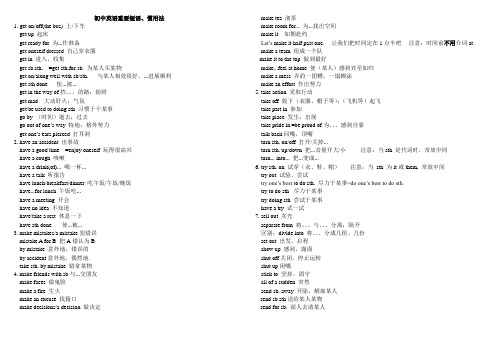
初中英语重要短语、惯用法1.get on/off(the bus) 上/下车get up 起床get ready for 为...作准备get oneself dressed 自己穿衣服get in 进入,收集get sb.sth. =get sth.for sb. 为某人买某物get on/along well with sb/sth. 与某人相处很好,...进展顺利get sth done 使...被...get in the way of挡、、、的路;妨碍get mad 大动肝火;气氛get/be used to doing sth 习惯于干某事go by (时间)逝去;过去go out of one’s way 特地;格外努力get one’s ears pierced 打耳洞2. have an accident 出事故have a good time =enjoy oneself 玩得很高兴have a cough 咳嗽have a drink(of)... 喝一杯...have a talk 听报告have lunch/breakfast/dinner 吃午饭/午饭/晚饭have...for lunch 午饭吃...have a meeting 开会have no idea 不知道have/take a rest 休息一下have sth done 使...被...3. make mistakes/a mistake犯错误mistake A for B 把A错认为Bby mistake 意外地,错误的by accident意外地,偶然地take sth. by mistake 错拿某物4. make friends with sb与...交朋友make faces 做鬼脸make a fire 生火make an excuse 找籍口make decisions/a decision 做决定make tea 沏茶make room for... 为...找出空间make it 如期赴约Let’s make it half past one. 让我们把时间定在1点半吧注意:时间前不用介词at make a team 组成一个队make it to the top 做到最好make...feel at home 使(某人)感到宾至如归make a mess 弄的一团糟,一塌糊涂make an effort 作出努力5. take action 采取行动take off 脱下(衣服、帽子等);(飞机等)起飞take part in 参加take place 发生;出现take pride in =be proud of为、、、感到自豪talk back回嘴,顶嘴turn sth. on/off 打开/关掉...turn sth. up/down 把...音量开大/小注意:当sth 是代词时,常放中间turn... into... 把...变成...6. try sth. on 试穿(衣、鞋、帽)注意:当sth 为it或them, 常放中间try out 试验、尝试try one’s best t o do sth. 尽力干某事=do one’s best to do sth.try to do sth 尽力干某事try doing sth 尝试干某事have a try 试一试7. sell out 卖光separate from 将、、、与、、、分离;隔开区别:divide into 将、、、分成几组、几份set out 出发,启程show up 感到,露面shut off关闭,停止运转shut up闭嘴stick to 坚持,固守all of a sudden 突然send sb. away 开除、解雇某人send sb sth送给某人某物send for sb. 派人去请某人send up 发射send out 发出,送出8. have a point 有道理Have a (great)influence on sb 对、、、产生(巨大的)影响hear from sb 收到...的来信hear of 听说9. hurry off 匆匆离去,赶快去hurry up 赶快10. hang out with sb 与某人闲逛11. teach sb. English 教某人英语teach oneself=learn sth.by oneself 自学in a row 连续几次in line with与、、、成一排in person亲身、亲自in public公开地in that case既然那样;假设那样的话in total 总共,合计12.by the end of +过去时间(用于过去完成时)到...末为止by the end of +将来时间(用于一般将来时)到...末为止at the end of+地点在...尽头in the end= at last 最后,终于13. hundreds of 成百上千five hundredthousands of 成千上万的six thousandmillions of 成百万的 seven million14. be pleased to do sth 很高兴地干某事be pleased with sth. 为某事而高兴15. be used for doing 被用来做、、、used to do sth过去常常做、、、be used as 被当作、、、用be used to doing sth 习惯于做某事be used by 被...所使用be used to do sth 被用来做某事16. so far 到目前为止,in the past/last few years 用于现在完成时17. on a Tuesday morning 一个星期二的早上on the morning of June 15th.1998 在1998年6月15日早上18. keep sb.doing sth. 让某人一直干某事keep doing sth. 继续做某事keep on doing sth. 持续不断地做某事keep sb away from doing sb 避免接近;远离keep off 远离,不接近keep one’s cool 沉住气;保持冷静kick sb off开除某人19. much too+形容词/副词原级实在太...too much+不可数名词too many+可数名词复数相当多的...eg. It’s _______ expensive. I can’t buy it.There’s ___________ rain this year.20. thanks to...由于,多亏thanks to one’s help=because of one’s help 由于某人的帮忙thanks for one’s help 谢谢某人的帮助21. be far away from+a place/sb 远离某地/某人22. because of + n. 因为、、、eg Because of the rain, we can’t go out.类似还有instead of sb/sth 代替、、、23.two-month holiday=two months’ holiday 二个月的假期an eight—year—old child 一个八岁的孩子24. fall asleep 入睡(进入状态)get to sleep 入睡(还没睡着)fall in love with sb 爱上某人fall over 从、、、摔倒25. stop/prevent/keep sb.from doing sth. 阻止某人干某事eg. She stopped the child from listening.stop doing sth. 停止干某事,不再干某事stop to do sth. 停止下来干另一件事。
英语单词惯用法(50)
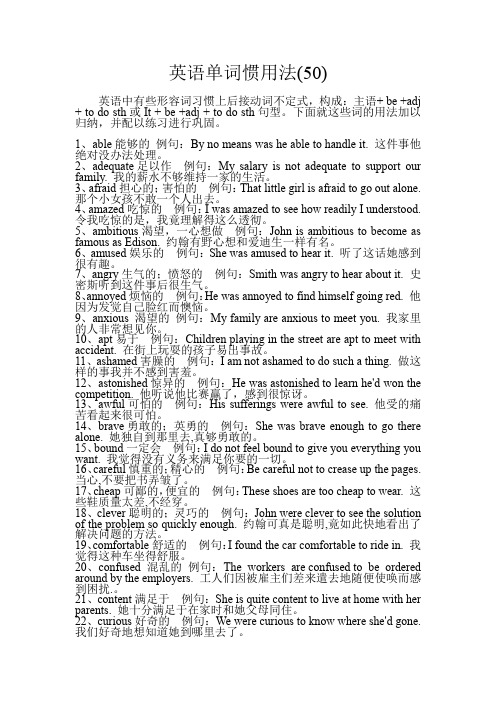
英语单词惯用法(50)英语中有些形容词习惯上后接动词不定式,构成:主语+ be +adj + to do sth或It + be +adj + to do sth句型。
下面就这些词的用法加以归纳,并配以练习进行巩固。
1、able能够的例句:By no means was he able to handle it. 这件事他绝对没办法处理。
2、adequate足以作例句:My salary is not adequate to support our family. 我的薪水不够维持一家的生活。
3、afraid担心的;害怕的例句:That little girl is afraid to go out alone. 那个小女孩不敢一个人出去。
4、amazed吃惊的例句:I was amazed to see how readily I understood. 令我吃惊的是,我竟理解得这么透彻。
5、ambitious渴望,一心想做例句:John is ambitious to become as famous as Edison. 约翰有野心想和爱迪生一样有名。
6、amused娱乐的例句:She was amused to hear it. 听了这话她感到很有趣。
7、angry生气的;愤怒的例句:Smith was angry to hear about it. 史密斯听到这件事后很生气。
8、annoyed烦恼的例句:He was annoyed to find himself going red. 他因为发觉自己脸红而懊恼。
9、anxious 渴望的例句:My family are anxious to meet you. 我家里的人非常想见你。
10、apt易于例句:Children playing in the street are apt to meet with accident. 在街上玩耍的孩子易出事故。
英语惯用法 7
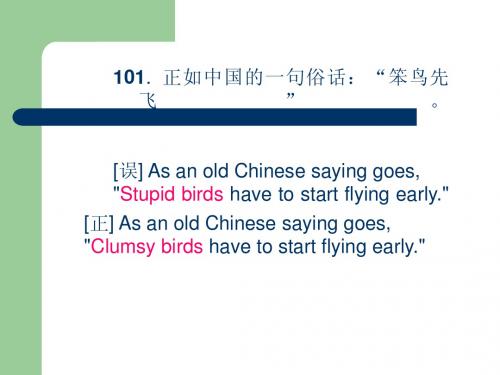
113. 裘德在乡下有一块菜地. [误] Jude has a piece of vegetable field in the countryside. [正] Jude has a piece of vegetable plot in the countryside. a paddy field 一块稻田 terraced fields 梯田等, plot 指"小块土地,小块地皮", an experimental plot of cotton(一块棉花试验田)
faceless -- 姓名不详的,匿名的,不露面的 shameless---无耻的,不要脸的(人) shameful --- 可耻的,丢脸的(行为) shameful conduct(可耻的行为) a shameless exploiter(无耻的剥削者).
111. 你们必须擦亮眼睛,弄清楚事情的真相. [误] You should wipe your eye and find out the truth. [正] You should remove the scales from your eyes and find out the truth. wipe one's eye ---"先发制人"或"使某人看到自 己 的狂妄"
[ 正 ] ---What would you like to drink? - ---A cup of weak tea, please.
light soup(清汤),a light diet(清淡的饮食) The tobacco is very mild(这烟草儿很淡). "淡茶"--- weak tea. strong drinks(烈性酒) strong tea(浓茶) thick soup(浓汤)
《英语惯用法》xin
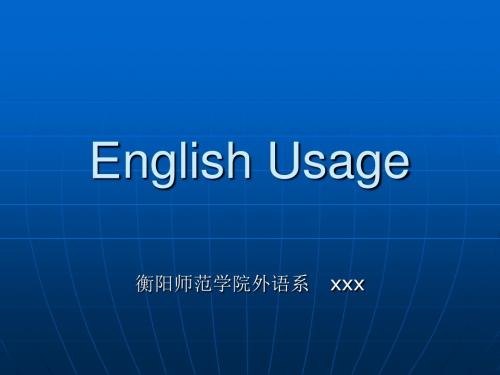
2. 表示“建议”、“提议”、“提倡”的动 词:advise, advocate, recommend, suggest 3. 表示“禁止”“阻止”等动词: discourage, bar, forbid, prevent, prohibit,proscribe 4. 表示“停止”“中止”或“放弃”的动词 或动词短语:discontinue、stop、 give up、leave off、quit等等
5. 表示“推迟”的动词或动词短语:defer、 delay、hold off、put off、postpone等 等 6. 表示“承认”“否认”的动词:admit、 acknowledge、confess、deny等等 7. 表示“回忆”“回想”“报道”“提到” 的动词:recall、recollect、mention、 report等等
表语从句和同位语从句
谓语动词形式: (should)+ 动词原形 Our decision is that the school remain closed for the time being.
They expressed the wish that they be given more free time. 常引起此类表语从句和同位语从句的名 词有: wish, idea, request, insistence, necessity, requirement, recommendation, proposal, decision, demand, plan, resolutio suggestion, order, motion(提议 ), desire, advice等.
save,preserve,keep,retain,reserve
《英语惯用法》学习园地
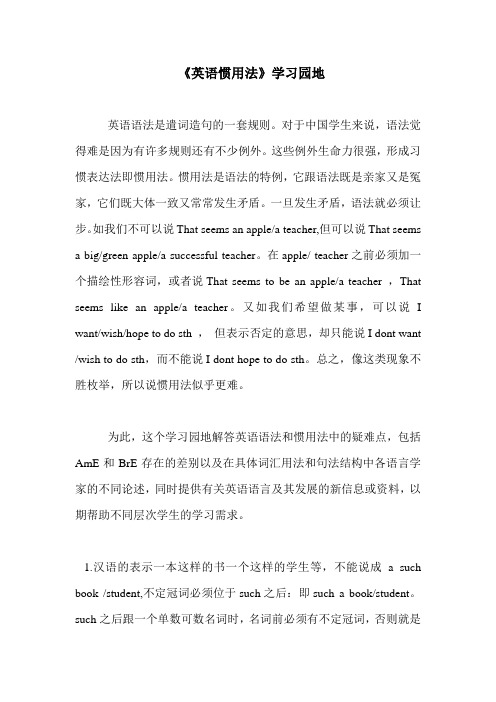
《英语惯用法》学习园地英语语法是遣词造句的一套规则。
对于中国学生来说,语法觉得难是因为有许多规则还有不少例外。
这些例外生命力很强,形成习惯表达法即惯用法。
惯用法是语法的特例,它跟语法既是亲家又是冤家,它们既大体一致又常常发生矛盾。
一旦发生矛盾,语法就必须让步。
如我们不可以说That seems an apple/a teacher,但可以说That seems a big/green apple/a successful teacher。
在apple/ teacher之前必须加一个描绘性形容词,或者说That seems to be an apple/a teacher ,That seems like an apple/a teacher。
又如我们希望做某事,可以说I want/wish/hope to do sth ,但表示否定的意思,却只能说I dont want /wish to do sth,而不能说I dont hope to do sth。
总之,像这类现象不胜枚举,所以说惯用法似乎更难。
为此,这个学习园地解答英语语法和惯用法中的疑难点,包括AmE和BrE存在的差别以及在具体词汇用法和句法结构中各语言学家的不同论述,同时提供有关英语语言及其发展的新信息或资料,以期帮助不同层次学生的学习需求。
1.汉语的表示一本这样的书一个这样的学生等,不能说成a such book /student,不定冠词必须位于such之后:即such a book/student。
such 之后跟一个单数可数名词时,名词前必须有不定冠词,否则就是错误的:*such book/student。
但是such位于not/no/any之后,名词前不用定冠词是正确的说法,因为no such/notany such=否定+such a的意思。
如:I have got such a book.=I havent got such book.=I have got no such book.There is not such an animal at the zoo.=There is not any such animal at the zoo.=There is no such animal at the zoo.2.下面哪些说法是正确的:A. only/quite/rather few days/studentsB. only/quite/rather a few days/studentsC. only/quite/rather little water/milkD. only/quite/rather a little water/milkE. very a few days/studentsF. a very few days/studentsG. very a little water/milkH. a very little water/milkB,D,F,H的说法是正确的,only/quite/rather表示肯定的意向,所以之后必须跟a few /little。
英语惯用法9
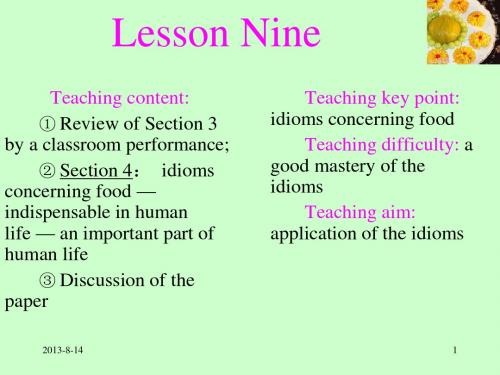
1.He eats like a horse / drinks like a horse. 饭量大如牛 牛饮 狼吞虎咽:wolf down sth.
2013-8-14
5
2. Ican eat a horse.
2013-8-14
6
3. He ate crow / humble pie / his words. 食言? NO! BUT: have to take back what one has said 食言: go back on one's word
2013-8-14 7
At the end of controversy, he had to eat the leek.
2013-8-14
8
Story for the above idiom
相传威尔士人的祖先曾在某年三月一日 在一个长着茂盛韭菜的园圃里打了胜仗, 立下战功。士兵们在狂欢之际,顺手从地 上拔起韭菜插在帽子上庆贺胜利。将韭菜 插在帽子上以示祝贺,胜利就逐渐成为威尔 士的风俗。当地人还在三月一日举行盛大 的圣大卫节来纪念这次胜利。在这个节日 里,人们都在帽子上插韭菜。
2013-8-14
Teaching key point: idioms concerning food Teaching difficulty: a good mastery of the idioms Teaching aim: application of the idioms
1
Part one: Review of Section 3
2013-8-14
28
C. Egg
1.I don‟t think it wise for you to put all your eggs in one basket. 孤注一掷
英语单词惯用法(21)
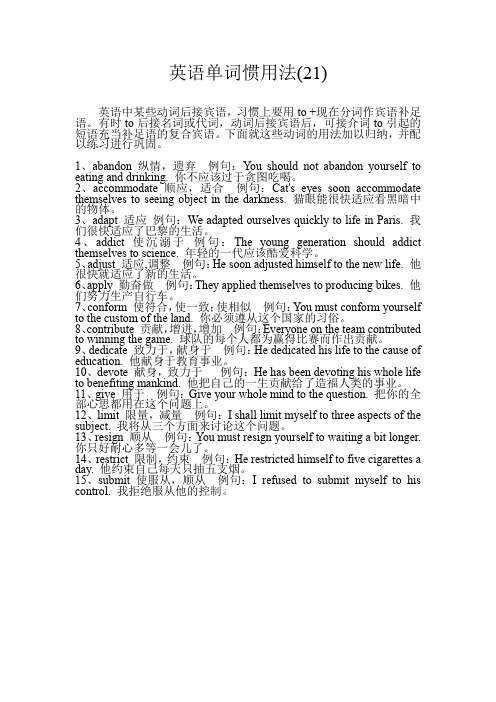
英语单词惯用法(21)英语中某些动词后接宾语,习惯上要用to +现在分词作宾语补足语。
有时to后接名词或代词,动词后接宾语后,可接介词to引起的短语充当补足语的复合宾语。
下面就这些动词的用法加以归纳,并配以练习进行巩固。
1、abandon 纵情,遗弃例句:You should not abandon yourself to eating and drinking. 你不应该过于贪图吃喝。
2、accommodate 顺应,适合例句:Cat's eyes soon accommodate themselves to seeing object in the darkness. 猫眼能很快适应看黑暗中的物体。
3、adapt 适应例句:We adapted ourselves quickly to life in Paris. 我们很快适应了巴黎的生活。
4、addict 使沉溺于例句:The young generation should addict themselves to science. 年轻的一代应该酷爱科学。
5、adjust 适应,调整例句:He soon adjusted himself to the new life. 他很快就适应了新的生活。
6、apply 勤奋做例句:They applied themselves to producing bikes. 他们努力生产自行车。
7、conform 使符合,使一致;使相似例句:You must conform yourself to the custom of the land. 你必须遵从这个国家的习俗。
8、contribute 贡献,增进,增加例句:Everyone on the team contributed to winning the game. 球队的每个人都为赢得比赛而作出贡献。
9、dedicate 致力于,献身于例句:He dedicated his life to the cause of education. 他献身于教育事业。
高中英语惯用法!
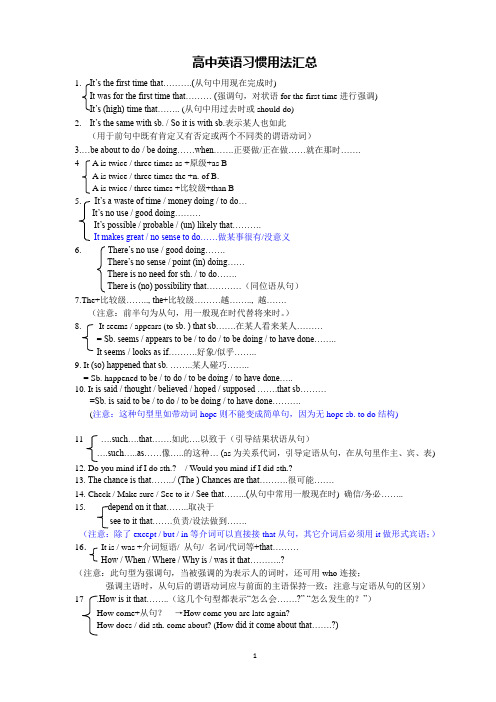
高中英语习惯用法汇总1.It’s the first time that……….(从句中用现在完成时)It was for the first time that……… (强调句,对状语for the first time进行强调)It’s (high) time that…….. (从句中用过去时或should do)2.It’s the same with sb. / So it is with sb.表示某人也如此(用于前句中既有肯定又有否定或两个不同类的谓语动词)3.…be about to do / be doing……when…….正要做/正在做……就在那时…….4 A is twice / three times as +原级+as BA is twice / three times the +n. of B.A is twice / three times +比较级+than B5. It’s a waste of time / money doing / to do…It’s no use / good doing………It’s possible / probable / (un) likely that……….It makes great / no sense to do……做某事很有/没意义6. There’s no use / good doing…….There’s no sense / point (in) doing……There is no need for sth. / to do…….There is (no) possibility that…………(同位语从句)7.The+比较级…….., the+比较级………越…….., 越…….(注意:前半句为从句,用一般现在时代替将来时。
)8. It seems / appears (to sb. ) that sb…….在某人看来某人………= Sb. seems / appears to be / to do / to be doing / to have done……..It seems / looks as if……….好象/似乎……..9. It (so) happened that sb. ……..某人碰巧……..= Sb. happened to be / to do / to be doing / to have done…..10. It is said / thought / believed / hoped / supposed …….that sb………=Sb. is said to be / to do / to be doing / to have done……….(注意:这种句型里如带动词hope则不能变成简单句,因为无hope sb. to do结构)11 ….such….that…….如此….以致于(引导结果状语从句)….such…..as……像…..的这种… (as为关系代词,引导定语从句,在从句里作主、宾、表)12. Do you mind if I do sth.? / Would you mind if I did sth.?13. The chance is that……../ (The )Chances are that……….很可能…….14. Check / Make sure / See to it / See that……..(从句中常用一般现在时) 确信/务必……..15. depend on it that……..取决于see to it that…….负责/设法做到…….(注意:除了except / but / in等介词可以直接接that从句,其它介词后必须用it做形式宾语;)16.It is / was +介词短语/ 从句/ 名词/代词等+that………How / When / Where / Why is / was it that………..?(注意:此句型为强调句,当被强调的为表示人的词时,还可用who连接;强调主语时,从句后的谓语动词应与前面的主语保持一致;注意与定语从句的区别)17 .How is it that……..(这几个句型都表示“怎么会…….?” “怎么发生的?”)How come+从句?→How come you are late again?How does / did sth. come about? (How did it come about that…….?)18. ①There seems / appears / happens to be / mu st be / can’t be / is (are, was, were) said to be /is (are, was, were) thought to be…表示“.似乎有/碰巧有/一定有/不可能有/ 据说有/认为有..”②介词(如of )there being 注意:there being / there to be为there be的非谓语形式;③want / wish / expect there to be要/希望/期待有……..④ad j. / adv. enough for there to be…….足够…….会有…….It is said / thought that there is / are…=There is / was / ar e / were said (thought) to be…→I have never dream of there being such a good chance for me.→It won’t be cold enough for there to be a frost tonigh t.19. 疑问词+插入语+陈述语序?→Who do you think he’ll have attend the meeting?20. But for + n. / pron;sb. / sth. would (not) have done…..要不是……., 某人早就……(虚拟语气)=If it had not been for…..,……./ If there had not been ……., ……..(虚拟语气)21. It won(’t) b e long before +从句(从句中用一般现在时)过一段时间才;没多久就…(否定)It was (not) long before+从句(从句中用一般过去时)过一段时间才;没多久就…(否定) 22. Those who………….(从句及主句中谓语动词用复数形式).Anyone who…………= Whoever………..(从句及主句中谓语动词用单数形式)23….主句(一般现在时或过去时)...when从句….(might / should do 或might / should have done) 表示”对比”,意思为“本该……(可)而却”,主句中为陈述语气,从句里为虚拟语气,如:→Why are you here when you should be in school? 你本该上学的怎么在这儿?→He stopped trying when he might have succeeded .本该已成功了他却停止努力了.24. There is. / Sb. have no doubt that………(同位语从句,that不可省略)There is / Sb. have some doubt whether……..(同位语从句不可用if)Sb. doubt if / whether…….Sb. don’t doubt that………25 immediately / directly / instantly / the moment +从句on / upon + n. / doing 注意:这几个结构都表示“一…….就;”No sooner had sb. done than …….(过去时)Hardly had sb. done when……..(过去时)26. every time / each time / the last time / the first time / next time +从句(名词性短语引导时状)anywhere / everywhere +从句(相当于wherever引导的地点状语从句)→You can go anywhere you like.→Next time you come, please bring your son along.27. If only / I wish +从句(用过去类时态) 表示虚拟语气, “要是…….就好了” “但愿……就好了!”28. Considering + n. 或pron. 或that从句/ Seeing that……….考虑到/鉴于…….Given + n. / pron作状语, 表示“在有……的情况下” “如果有” “假定”, 有时也表示”考虑到”→Seeing (that) he refused to help us, there is no reason why we should help him now.→Given good health, I hope to finish the work this year. 类似providing/ provided supposing/suppose →Given their inexperience / that they are inexperienced, they’ve done a good job.29. There was a time when…….曾经有那么一度……….30. other than与no, not, none等否定词连用,表示肯定意思,如:→It was none other than Mr. Smith. 这正是Smith先生.31. Not until…….did / do/ does / will sb. do……It was / is not until ……that sb………32. It’s (un) like sb. to do / to have done……做某事很像某人/ 做某事可不像某人33. It remains to be seen Wh--words ……..是否…….还有待于看.(不用that、if作连接词)34. It only remains for sb. to do……剩下的只是要某人做某事.→We’ve got everything ready. It only remains for you to come to dinner.35. One moment……., and now………刚才一会儿还在做……而现在却……..36. Not all / both / everyone………表示部分否定37. Such is / are……..这(些) 就是…….(谓语动词单复数由后面名词决定)38. I’d rather (not) do / have done……我宁愿…..I’d rather +从句(从句中用过去时或过去完成时)39. It’s important / necessary / strange / surprising….+that……(用陈述语气或should do)40. I like / hate / appreciate it that / when等从句(it表示后面从句的这种情况)→I appreciate it if you will give me a hand.41. By the time +从句(一般现在时/过去时),主句(将来完成时/过去完成时)42. As is often the case with sb. / As is usual with sb.(as引导非限制性定语从句)43. in case / lest / f or fear that…….(从句中用陈述语气或should do)44.While置于句首可表示As long as 或Although→While there is life there is hope.→While I admit his good points, I can see his bad ones.45. can not (never) ……too +adj. (adv. ) / adj. (adv.) + enough “越……越好”“非常”too + adj. (anxious /glad/ready/easy/ eager / nice/willing / happy /inclined/please ) +to do表示肯定→I can’t thank you enough.我非常感激你.→He was too glad to see his father.= He was very glad to see his father.46. not / never等表示否定的词与比较级连用表示最高级,如:--Do you agree with his suggestion?--I can’t agree more.47. What if……..要是…….怎么办?→What if he doesn’t come tomorrow?48. more……..than与其…….不如……..→He is more nervous than frightened.49. It is / has been +一段时间+since从句(从句中如为延续性动词,则实际表示的意思相反)→It is two years since he drank.他不喝酒已两年了.【实战演练】1.Mr. Smith didn’t understand ______made his son so upset this morning.A. what was itB. why it was thisC. how that wasD. what it was that2.-----Did you have a good sleep last night?----Yes, never sleep _______.A. badlyB. betterC. worseD. best3.We are only _____glad to do anything we can _______her.A. too; to helpB. very; help C too; help D. very; helping4.-----How come you are late for class again?-------_____________.A. Because I missed the busB. By bus and then on footC. Please excuse meD. It’s quite wrong5._______more than 3,000languages in the world.A. There are thought to beB. There is thought to beC. They are thought to beD. It is thought to be6.-----George is a wise person.-----But in my opinion, he is ______than wise.A. clevererB. braverC. more braveD. less brave7.-----So can I ask you a few fairly straightforward questions about yourself?-----No problem. I like ________when people are open and direct.A. thatB. thisC. itD. them8.-----______I move the picture over here?----I suppose it’ll look better.A. How ifB. What aboutC. How aboutD. What if9.China has produced ______this year as it did in 2002.A. as twice much steelB. twice steel as muchC. twice as much steelD. as much steel twice10. -----_______was it ______you discovered the secret of his?------Totally by chance.A. How; whenB. What; thatC. What; whenD. How; that11. -----Who on earth could it be?-----It was _______other than Clint Eastwood.A. noneB. nothingC. notD. nobody12._____his age, he did it quite well, so don’t ______him any more.A Given; blame B. Considered; say C. To regard; scold D. Considering; speak13. No sooner _____themselves in their seats in the theatre ______the curtain went up.A. they have settled; beforeB. had they settled; thanC. have they settled; whenD. they had settled; than14. -----Did you meet with the famous space hero, Yang Liwei?------______I had come here earlier!A. If onlyB. If notC. But forD. For fear15. The students expected __________more reviewing classes before the final exams.A. it would beB. there beingC. it to beD. there to be16. Students shouldn’t be given so difficult a problem _____they can not work out.A. thatB. whichC. whileD. as17. It was twelve o’clock at midnight _______they arrived at a lonely village.A. thatB. beforeC. sinceD. when18. -----The exam wasn’t difficult, was it?-----No, but I don’t think ______could pass it.A. somebodyB. anybodyC. everybodyD. nobody19. -----I always take care when doing papers on the computer.----You meant it! One can not be _______careful working on it.A. tooB. veryC. soD. quite20. -----Is Miss White working these days?----No. It is two months since she worked here.------Oh, _____________?A. where is she working nowB. would you please show me the wayC. which is her officeD. is she ill。
英语单词惯用法(3)
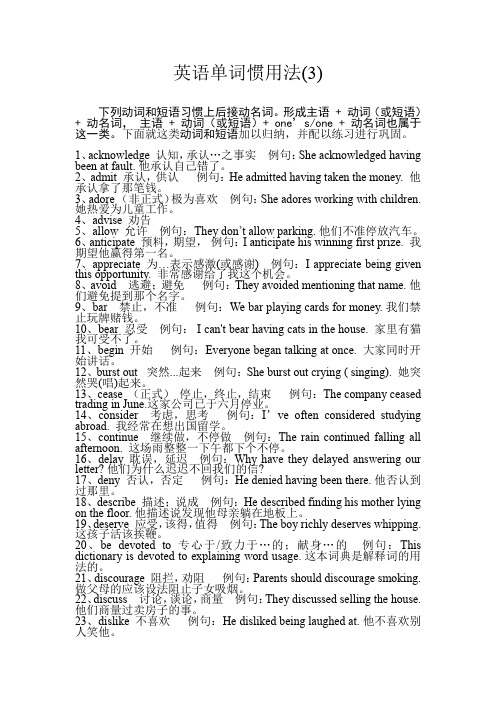
英语单词惯用法(3)下列动词和短语习惯上后接动名词。
形成主语 + 动词(或短语)+ 动名词,主语 + 动词(或短语)+ one’s/one + 动名词也属于这一类。
下面就这类动词和短语加以归纳,并配以练习进行巩固。
1、acknowledge 认知,承认…之事实例句:She acknowledged having been at fault.他承认自己错了。
2、admit 承认,供认例句:He admitted having taken the money. 他承认拿了那笔钱。
3、adore (非正式)极为喜欢例句:She adores working with children. 她热爱为儿童工作。
4、advise 劝告5、allow 允许例句:They don’t allow parking.他们不准停放汽车。
6、anticipate 预料,期望,例句:I anticipate his winning first prize. 我期望他赢得第一名。
7、appreciate 为…表示感激(或感谢) 例句:I appreciate being given this opportunity. 非常感谢给了我这个机会。
8、avoid 逃避;避免例句:They avoided mentioning that name.他们避免提到那个名字。
9、bar 禁止,不准例句:We bar playing cards for money.我们禁止玩牌赌钱。
10、bear 忍受例句:I can't bear having cats in the house. 家里有猫我可受不了。
11、begin 开始例句:Everyone began talking at once. 大家同时开始讲话。
12、burst out 突然...起来例句:She burst out crying ( singing). 她突然哭(唱)起来。
英语单词惯用法(4)
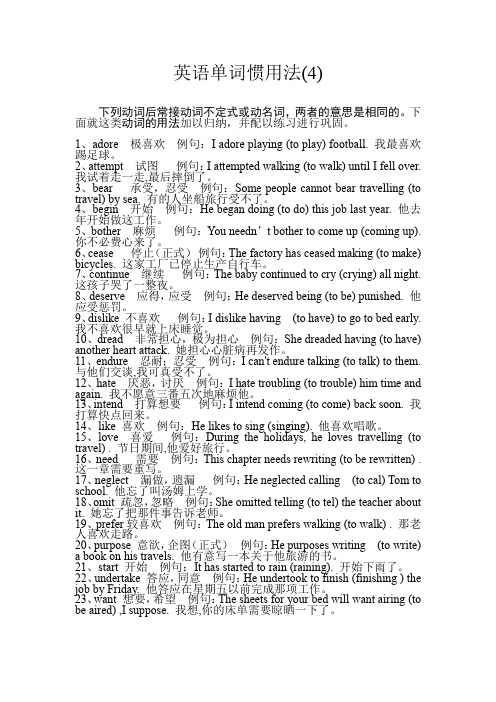
英语单词惯用法(4)下列动词后常接动词不定式或动名词,两者的意思是相同的。
下面就这类动词的用法加以归纳,并配以练习进行巩固。
1、adore 极喜欢例句:I adore playing (to play) football. 我最喜欢踢足球。
2、attempt 试图例句:I attempted walking (to walk) until I fell over. 我试着走一走,最后摔倒了。
3、bear 承受,忍受例句:Some people cannot bear travelling (to travel) by sea. 有的人坐船旅行受不了。
4、begin 开始例句:He began doing (to do) this job last year. 他去年开始做这工作。
5、bother 麻烦例句:You needn’t bother to come up (coming up). 你不必费心来了。
6、cease 停止(正式)例句:The factory has ceased making (to make) bicycles. 这家工厂已停止生产自行车。
7、continue 继续例句:The baby continued to cry (crying) all night. 这孩子哭了一整夜。
8、deserve 应得,应受例句:He deserved being (to be) punished. 他应受惩罚。
9、dislike 不喜欢例句:I dislike having (to have) to go to bed early. 我不喜欢很早就上床睡觉。
10、dread 非常担心,极为担心例句:She dreaded having (to have) another heart attack. 她担心心脏病再发作。
11、endure 忍耐;忍受例句:I can't endure talking (to talk) to them. 与他们交谈,我可真受不了。
英语常用词惯用法
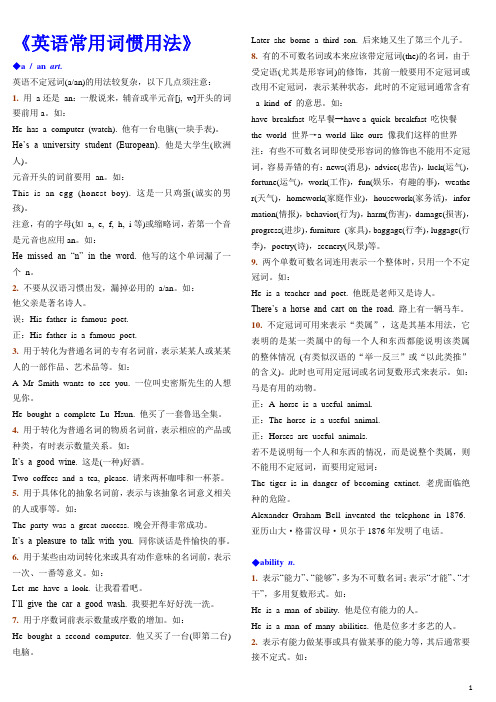
《英语常用词惯用法》◆a / an art.英语不定冠词(a/an)的用法较复杂,以下几点须注意:1.用a还是an:一般说来,辅音或半元音[j, w]开头的词要前用a。
如:He has a computer (watch). 他有一台电脑(一块手表)。
He’s a university student (European). 他是大学生(欧洲人)。
元音开头的词前要用an。
如:This is an egg (honest boy). 这是一只鸡蛋(诚实的男孩)。
注意,有的字母(如a, e, f, h, i等)或缩略词,若第一个音是元音也应用an。
如:He missed an “n” in the word. 他写的这个单词漏了一个n。
2.不要从汉语习惯出发,漏掉必用的a/an。
如:他父亲是著名诗人。
误:His father is famous poet.正:His father is a famous poet.3.用于转化为普通名词的专有名词前,表示某某人或某某人的一部作品、艺术品等。
如:A Mr Smith wants to see you. 一位叫史密斯先生的人想见你。
He bought a complete Lu Hsun.他买了一套鲁迅全集。
4.用于转化为普通名词的物质名词前,表示相应的产品或种类,有时表示数量关系。
如:It’s a good wine. 这是(一种)好酒。
Two coffees and a tea, please. 请来两杯咖啡和一杯茶。
5.用于具体化的抽象名词前,表示与该抽象名词意义相关的人或事等。
如:The party was a great success. 晚会开得非常成功。
It’s a pleasure to talk with you. 同你谈话是件愉快的事。
6.用于某些由动词转化来或具有动作意味的名词前,表示一次、一番等意义。
如:Let me have a look. 让我看看吧。
《大学英语》惯用法疑难解析-精品文档
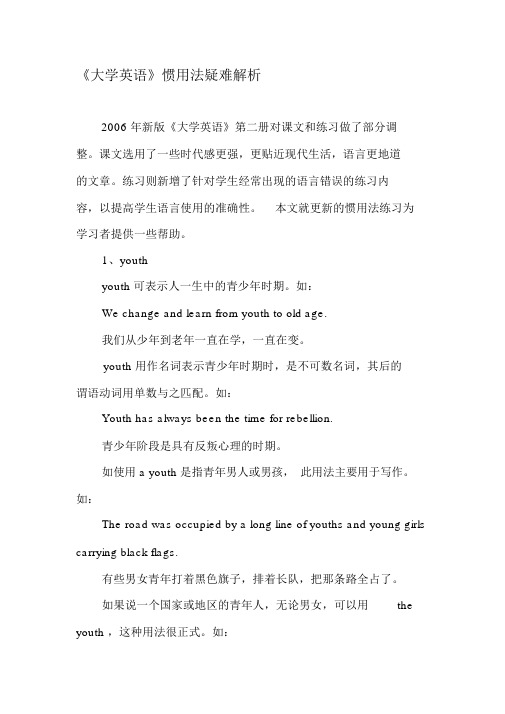
《大学英语》惯用法疑难解析2006 年新版《大学英语》第二册对课文和练习做了部分调整。
课文选用了一些时代感更强,更贴近现代生活,语言更地道的文章。
练习则新增了针对学生经常出现的语言错误的练习内容,以提高学生语言使用的准确性。
本文就更新的惯用法练习为学习者提供一些帮助。
1、youthyouth 可表示人一生中的青少年时期。
如:We change and learn from youth to old age.我们从少年到老年一直在学,一直在变。
youth 用作名词表示青少年时期时,是不可数名词,其后的谓语动词用单数与之匹配。
如:Youth has always been the time for rebellion.青少年阶段是具有反叛心理的时期。
如使用 a youth 是指青年男人或男孩,此用法主要用于写作。
如:The road was occupied by a long line of youths and young girls carrying black flags.有些男女青年打着黑色旗子,排着长队,把那条路全占了。
如果说一个国家或地区的青年人,无论男女,可以用the youth ,这种用法很正式。
如:The youth of this country receive better education than the youth of that country.这个国家的年轻人比那个国家的得到更好的教育。
也可用 the youth表示某一特定时期的青年人。
如:The youth today are better educated than theirforefathers.现在的年轻人比他们的父辈得到更好的教育。
youth 用指某个国家或某个时代的青年人时,应看作复数名词,谓语动词用复数与之匹配。
2.smell用 smell of表示某处或某物散发出某种气味。
如:The narrow , sunless hall smelled unpleasantly of stale cabbage.又窄又暗的前厅散发出难闻的烂菜味。
